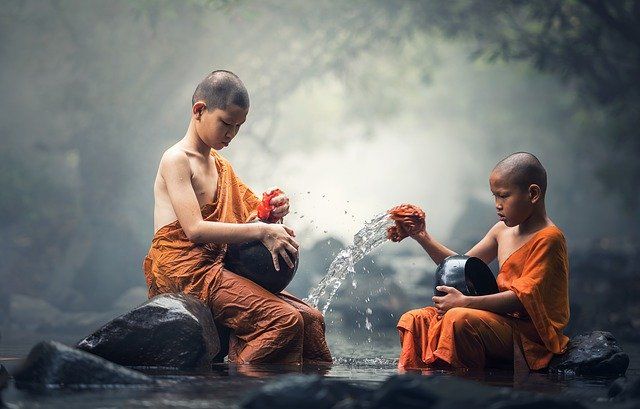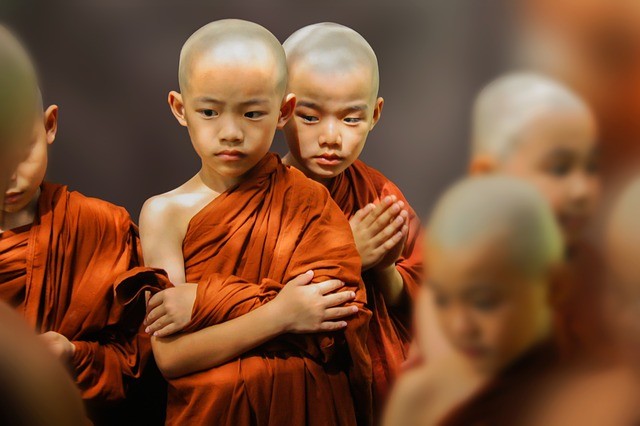Buddhism is a concept of the religion founded by Gautam Buddha. It is not only a religious belief but also a spiritual practice and spiritual tradition. 7 percent of the people of the world are Buddhist. Buddha was born in Lumbini, Nepal, 563 BC. He got enlightened and started to spread the message of peace to the most of the Asian countries so he is called as the ambassador of peace of Asia.

The main philosophy of Buddhism can be categorized into three parts. They are four noble truths, eightfold paths, and Pancasila. The Buddhist philosophy is written in three Tripitakas. Three Tripitakas are:
- Binaya Pitak: This is the scripture of Buddhism which includes the rules for the monks and nuns.
- Shukti Pitak: This part of Tripitaka has the sermons of the Buddha.
- Abhidhamma Pitak: This is the book of the collection of the philosophies of Buddhism.
Here are the four noble truths of Buddha:
- There is suffering in life
- There is the reason for suffering
- There is the way to be free from the suffering
- The way of being free from suffering is eightfold paths
- There is suffering in life: Suffering is the part of our life which is inseparable for everyone who is born in this world. We are born here with the suffering. We have to be in suffering in our life until and unless we don’t get enlightened. Buddha focused on the fact that life can’t be imagined without suffering. Suffering is as true as our life is. It is said that who is enlightened, he or she should not be born in this world. If we have some Karmic debt, we have to born here in this world.
- There is the reason behind suffering: Buddha’s teaching always clarifies the reason for everything and the solution of every reason. The main cause of the suffering is the desire. How much we get in our life, we want more and more. The chain of gaining will not over. There are unlimited desires in human mind. The human can’t be satisfied with the worldly affairs, world’s achievement. There are limited resources to fulfill our desires but we have unlimited desires so the available resources can’t fulfill our desires. The nature of desire is like a pot where we can’t put anything because it doesn’t have the lower part so from where everything can fall.
- There is the way to be free from the suffering: There is the way to be free from the suffering. Buddha’s teaching is very scientific because he raised the hypothesis that there is suffering in this world and at the end, he gave the exact solution of the hypothesis. Now, we have the hope that we can be free from all the sufferings of the world. It is in our hand to be free from all the sufferings. If we want, we can be free from all the pains and discomforts.
- The way of the freedom of the suffering is eightfold path: If we practice the eightfold path, we can be free and get the liberation from the suffering of the world. They are the real solutions to our life’s suffering. They are the Real Techniques to be totally free from the desires of our life.

Right View: View means the attitude. We have to see anything that that thing is real. In a simple way, we see what we want to see. We don’t have to judge anything by our perspective. We think that death is the end of our life, which is the main cause of the fear in our life. Fear creates suffering. We have to know everything in their real existence.
Right Resolution: This is the second step of the eightfold path. In this step, we take the right resolution of our mental development. We take firm determination to love all the being of the world. We focus on being polite to others and to be sincere when we behave with others.
Right Speech: We have to speak the truth all the time. Speaking truth can lead us to the higher level in the path of liberation. If there is something harmful matter to others, we don’t have to speak. We don’t have to speak the false because false is not the way of liberation. False is not the part of the higher source.
Right Action: We don’t have to perform the action that is not right. We have to analyze whether it is right or not before we do anything. We don’t have to harm to others by our action. We don’t have to suffer others by our action.
Right Livelihood: We have to live with the minimal things that we need to live. We don’t have to collect more than we need. We don’t have to do the profession, which is the harm to others.
Right effort: We have to try to change our habits or we have to try to be better and better. We have to be able to change our overall factors of life from negative to positive. We have to be bold to be better.
Right Mindfulness: We have to try to be aware every moment. We don’t have to lose the awareness because the awareness can lead us to the higher source. We have to be guided by the real knowledge rather than the false knowledge. We have to develop our mind to accept the higher source of knowledge.
Right concentration or Meditation: We have to practice the meditation of four types. To unite our self to the higher source, we have to practice the meditation. In this state, we are free from the ego. We are able to understand the natural state of our life. The flow of life can be seen in this state.
Pancasila:
- Not killing
- Not stealing
- To be away from sensual (including sexual) misconduct
- Not lying
- Not to be in the state of intoxication

Five moral virtues are the very important part of the eightfold path. These five virtues are the common people. There are eight or ten virtues for the monks and nuns.
Different branches of Buddhism are as follows:
Mahayana: It believes that the scripture should be changed by the time. It focuses that we all have the possibility to be enlightened in our life.
Theravada: Theravada Buddhism is the branch of traditional Buddhism. It is the oldest form of Buddhism. It believes that the original Buddhism is the pure Buddhism. It focuses on the learning the teachings of Buddha and doing the meditation. It is a very powerful concept that we have to search the wisdom.
Vajrayana: Vajrayana is thebranch of Buddhism which believes in Tantra. Tibetan Buddhism is in this category. We have to start our spiritual practice with a much matured Guru.
